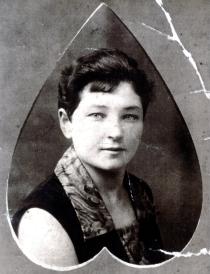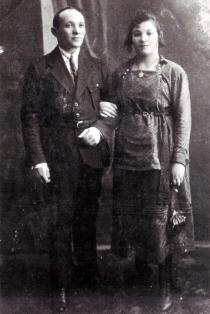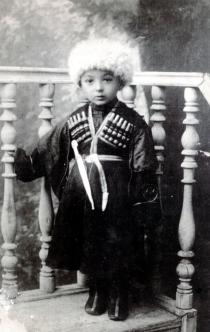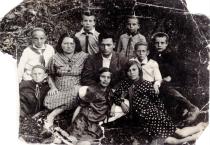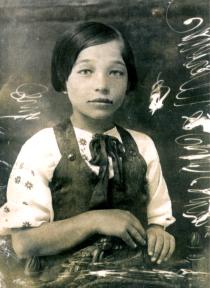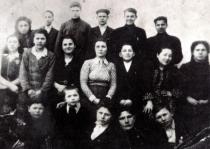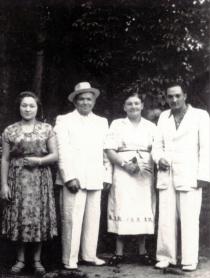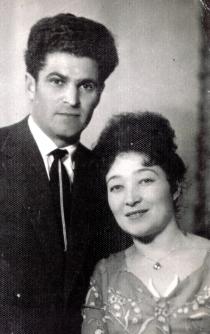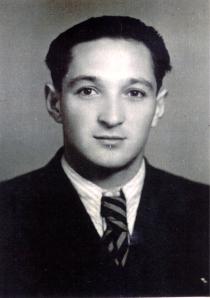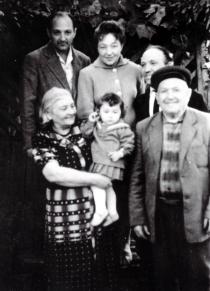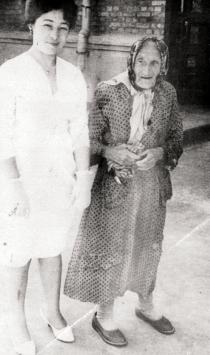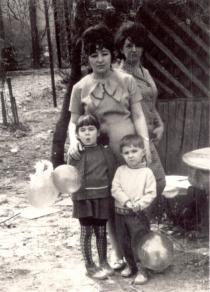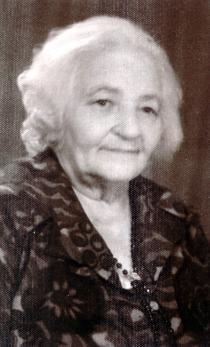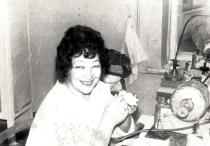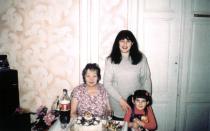This is a picture of my older brother Oosher Roizen. The photo was taken in Ozarintsy in 1929.
My parents got married in 1921. They settled down in the biggest house in Ozarintsy, a big stone house with wooden floors. There were 11 rooms in the house: my parents' bedroom, a big living room and two children's rooms. There were several guest rooms and a big room where almost all inhabitants of Ozarintsy had their wedding parties. There was an orchard near the house and a big yard with sheds and a well that my father had made. My parents kept two cows, at least 20 sheep, chickens, geese and turkeys. My father, my brother and I helped my mother to take care of the livestock. There was a machine for making butter. My mother made butter and other dairy products herself. She was a housewife. She didn't keep housemaids, but twice a week Russian women came to help her with the cleaning and laundry.
My older brother was born in 1927. My mother named him Oosher after Grandmother Gitl's father. My parents spoke Yiddish in the family. We communicated in Yiddish with Jewish children and in Ukrainian with our Ukrainian neighbors' children.
We observed Jewish holidays. Our favorite holiday was Pesach. Special dishes and utensils were taken down from the attic. Sometimes we didn't have enough Pesach utensils, and my mother koshered everyday kitchen utensils so that we could use them for Pesach. They were cleaned with water and scrubbed with sand and ash before they were boiled in a big bowl with stones inside. The Soviet authorities closed the Jewish bakery, but Jewish women got together to bake matzah in the house across the street where we lived. We didn't have any bread at home on Pesach. We had matzah made for our family from one pood [16 kg] of flour. A special motselakh [round flat matzah cookie] was made for children. There was flour made from matzah in a mortar with a wooden pestle. The flour was sieved and what was left in the sieve my mother used for making dumplings for chicken broth. She made cakes, sponge cakes, bagels, fluden and cookies from matzah flour. She had special patterns for cookies: menorah shaped, magen David, tree-shaped, etc. There was also keyzl and potato pancakes. Mother made chicken broth, meat stew and sweet and sour stew, mamalyga, cutlets with garlic sauce and gefilte fish. It took her a while to make all this food, but the family helped her. In the morning my parents went to the synagogue, and in the evening my father conducted seder. There were koyses for each member of the family and one for Elijah, the Prophet . My father had the biggest cup, we, children, had smaller cups. Adults had kosher wine and children had a little of it, too. My brother posed the traditional four questions [the mah nishtanah] in Yiddish to my father. My father responded in Hebrew. Then my father read from the Bible and we sang songs in Yiddish. My mother knew many of them, and they were beautiful songs. My father hid the afikoman, and one of the children had to find it. The afikoman was given back to my father for redemption.

